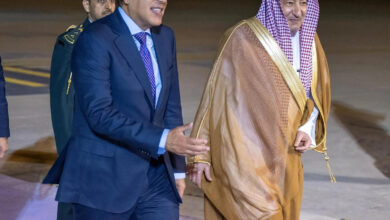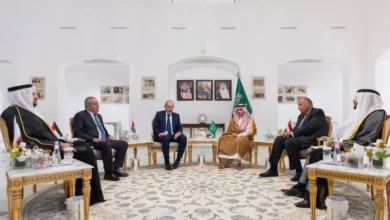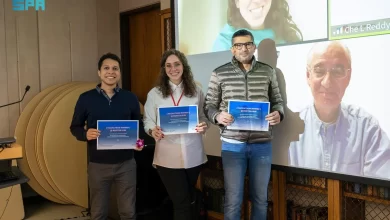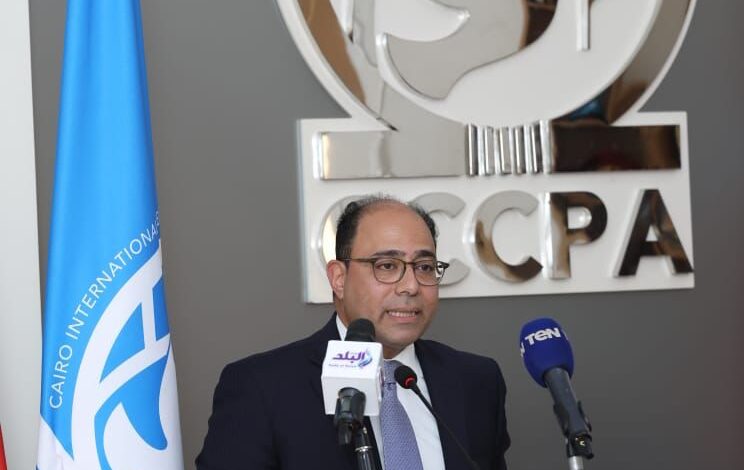
Asgraf AboArafe
A training course was opened at the Cairo International Center for Conflict Resolution, Peacekeeping and Peace Building (CRPB) today, February 20, on “The Role of the Media in Covering and Resolving Conflicts for Egyptian Journalists.” The course will be held in cooperation between the Center and the Department of Public Diplomacy at the Ministry of Foreign Affairs during the period from February 25 to 28, with the participation of 20 Egyptian media figures and journalists, with support from the Canadian Fund for Local Initiatives.
The course began its work with an interactive panel discussion on “Media and Conflict Coverage,” in which Ambassador Ahmed Abu Zeid, the official spokesman and Director of the Public Diplomacy Department at the Ministry of Foreign Affairs, Ambassador Ahmed Abdel Latif, Director of the Cairo International Center for Conflict Resolution, Preservation and Peacebuilding, and media figure Nashaat Al-Daihi, a member of the Council, spoke. The Supreme Council for Media Regulation, Dr. Leila Belrahoma, a Tunisian researcher in the audio-visual field, was moderated by journalist Samir Omar, office director of Sky News Arabia in Cairo. The panel discussion addressed the relationship between official media and conflict coverage, the mutual influence between conflicts and media coverage, as well as the role of drama in spreading a culture of peace, in addition to examining some field experiences of media voices from conflict areas.
Ambassador Ahmed Nihad Abdel Latif had indicated in his opening speech that holding this session comes within the framework of the role played by the Center in the field of building the capabilities of Egyptian cadres. He stated that the complex challenges taking place in the region and the world cast a shadow on peace-building and conflict resolution efforts, as well as on the nature of media work and its requirements, which requires providing the highest levels of qualification and training by highlighting the nature of the conflict, its causes, stages, and parties, in addition to ways to employ the available tools. To settle it. The Director of the Cairo Center also touched on the risks to which media personnel are exposed while performing their work in conflict areas, citing the developments in the current situation in the Gaza Strip, which led to the downfall of a huge number of media professionals. He added that the course will include sessions on identifying the main challenges related to journalistic coverage of conflicts and how to overcome them.
For his part, Ambassador Ahmed Abu Zeid, the official spokesman and director of the Public Diplomacy Department at the Ministry of Foreign Affairs, stated that this session is being held at a critical time when the Middle East and Africa region is witnessing an unprecedented spread of armed conflicts, which are now directly affecting the interests and concerns of the peoples of the region, and are also imposing additional responsibility. Those working in the field of media, especially in the style of media coverage of these conflicts, and the extent to which they understand their nature, historical, geopolitical and social dimensions and their intertwined complexities.
Abu Zeid added that the training course is attended by an elite group of media professionals, lecturers, experts and university professors with a great deal of experience and competence, with the aim of transferring their expertise and field experiences to the trainee journalists and media cadres, whom the Ministry of Foreign Affairs was keen to represent the major newspapers, news agencies and media platforms in Egypt.
On a related level, the Acting Canadian Ambassador to Egypt expressed his appreciation for his country’s fruitful cooperation with the Cairo International Centre. He also thanked the Center and the Ministry of Foreign Affairs for holding this session, which comes within the framework of the distinguished relations between the two countries in several fields, most notably the field of peacekeeping and peacebuilding. He also stressed the importance of this course, taking into account the pivotal role played by the media in covering conflicts, which requires the highest standards of professional performance.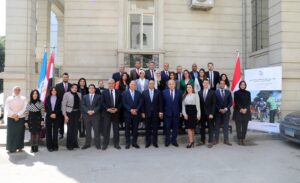
It is worth noting that the training course includes sessions on the role of the media and the press in shaping views and public opinion on conflicts, the role of the media and press coverage in building peace, in addition to the role of the image in building peace in conflict areas, and news coverage that is sensitive to conflict sensitivity and gender-sensitive. In addition to the above, the course will address conflict resolution methods, conflict analysis tools, the gender perspective in conflict and peace contexts and the role of women in making and building peace.


